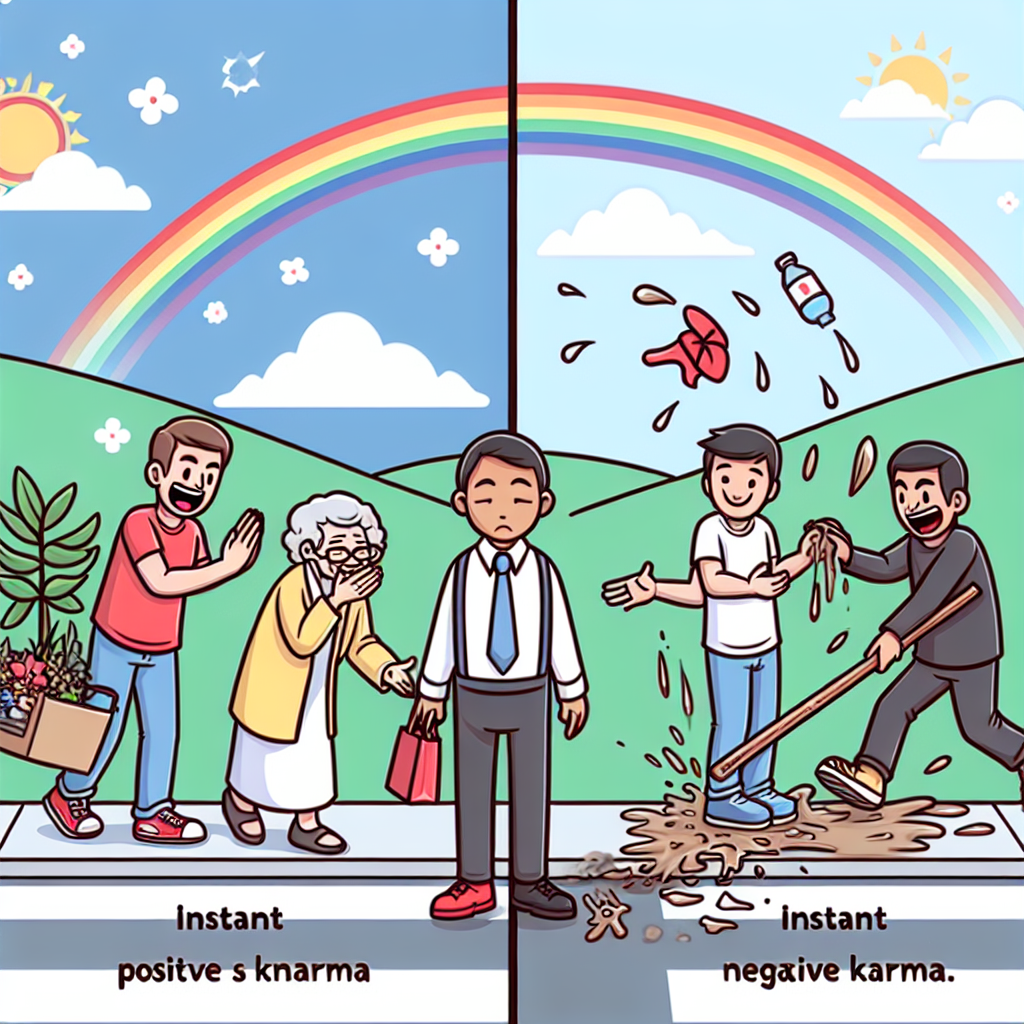The concept of karma—drawing from Hinduism and Buddhism—denotes the idea that actions have consequences, both good and bad. However, the term "instant karma" has emerged as a popular interpretation in contemporary culture, suggesting that the universe has a special way of delivering immediate feedback. While traditional karma may take time to manifest, the instant variety implies a swift response from the cosmos, creating a fascinating discussion around morality, personal behavior, and the interconnectedness of human actions.
Understanding Karma
Before delving into the nuances of instant karma, it’s essential first to grasp the traditional concept of karma. Originating from Sanskrit, "karma" means action, work, or deed—in essence, the idea that our actions, whether physical, verbal, or mental, have implications that can echo through time. According to this principle, good deeds result in positive outcomes, while negative actions lead to adverse consequences.
In traditional Eastern philosophies, karma operates on a timeline that may span lifetimes. Thus, one might plant seeds now only to reap the harvest in another life. This idea can feel somewhat abstract, especially for those seeking immediate affirmation or response for their actions.
The Allure of Instant Karma
Enter "instant karma," the notion that good deeds lead to instant rewards, while bad deeds lead to immediate consequences. This perception resonates deeply with human experience; the idea that the universe has a way of giving back what you invest offers a comforting, albeit simplified, understanding of moral reciprocity. The concept serves as not only a moral compass but also a potential motivator for behavior.
Imagine someone helping an elderly person across the street, only to find a $20 bill on the ground moments later. Stories such as these, often shared in person or on social media, provide a sense of justice and satisfaction. They foster the belief that kindness begets kindness—and conversely, that malicious actions might lead to instant retribution.
Examples of Instant Karma
Instant karma manifests itself in various ways, both humorous and sobering. Some popular examples include:
The Clumsy Thief: Picture a would-be thief trying to snatch a purse, only to trip and fall as they take off running. Their immediate consequence serves as a comical reminder of the perils of wrongdoing.
The Road Rager: A driver who aggressively cuts off another car, only to have a flat tire moments later, presents a classic instance of karma’s swift justice.
Acts of Kindness: An individual who donates to charity and is later rewarded unexpectedly, perhaps with a promotion at work or a long-lost friend reaching out, illustrates the idea that benevolence can lead to immediate positive outcomes.
- Public Shaming: In the age of social media, acts of public shaming can often backfire. For example, if someone criticizes another, they might immediately find themselves under scrutiny, illustrating the notion of instant karma in the face of public judgment.
These anecdotes resonate with individuals and provide encouragement to act ethically and kindly. The universal belief that good intentions can bloom without delay serves to enhance the human experience and counter the sometimes overwhelming noise of the world.
Psychological Insights
From a psychological perspective, instant karma possesses a dual-layered benefit. On one hand, it reinforces moral behavior by providing a compelling reason to act with integrity. Reinforcement theories suggest that immediate feedback can effectively encourage preferred behaviors.
On the other hand, the concept can invoke a sense of guilt or fear regarding bad actions due to the potential for immediate negative consequences. This awareness may keep adverse behaviors in check, as individuals weigh the risks of their actions.
However, it’s essential to recognize that not all observations of instant karma are genuine or fair. Life can often appear chaotic and arbitrary, dispensing rewards and punishments in unclear fashion. Factors such as privilege, circumstance, and individual choices further complicate discussions surrounding morality and the perceived equity within the instant karma framework.
Philosophical and Ethical Considerations
While the idea of instant karma often garners enthusiasm, it also raises philosophical questions regarding the principles of justice and fairness. Is it realistic to believe that life operates on such a straightforward system of reward and punishment? Can we genuinely expect immediate reciprocity for our actions, or is that merely a comforting illusion?
Critics of the instant karma theory posit that not everyone receives immediate feedback, which can lead to disillusionment. Many people engage in altruistic behavior selflessly, without the expectation of reward—a controversial departure from the instant karma philosophy.
Moreover, the concept of instant karma can contribute to a lack of empathy. Believing that everyone should receive what they deserve immediately may cause individuals to overlook the complexities of others’ situations. Personal circumstances and various inequalities can hinder a straightforward moral ledger, whereby someone facing adversity may not appear to receive just deserts for their actions.
Cultivating Positivity Through Instant Karma
Despite its drawbacks, the idea of instant karma can still serve as a useful framework for cultivating personal growth and positive behavior. Whether one takes it as a guiding principle or a philosophical exploration, it encourages reflection on the weight of our actions.
Choosing to engage in kindness, practicing generosity, or simply being aware of the impact of our words can influence not only our lives but also the lives of those around us. Adopting a mindset centered on instant karma can inspire community growth, foster relationships, and create meaningful connections.
FAQs
1. What is the difference between karma and instant karma?
Karma generally refers to the belief that actions have consequences over time, which may accumulate across lifetimes. Instant karma, however, is the notion that actions can lead to immediate feedback—positive or negative—without delay.
2. Is instant karma a scientifically proven phenomenon?
While instant karma makes for compelling anecdotes, it is not scientifically proven. The concept is more philosophical and anecdotal rather than anchored in empirical evidence.
3. Can instant karma be applied in daily life?
Yes, many people apply the belief in instant karma by striving to engage in positive actions, under the assumption that doing good can lead to beneficial outcomes for themselves or others.
4. Does instant karma support the idea of justice?
While instant karma can provide a sense of immediate justice or balance, it can also oversimplify the complexities of life. Not all actions receive corresponding immediate consequences, which signifies a multifaceted understanding of justice.
5. How does instant karma differ culturally?
While the concept of karma originates from Eastern philosophies, instant karma has found its place in popular culture across various areas. Its interpretation can differ among cultures, with differing beliefs about morality, consequences, and fate.
In conclusion, instant karma offers an intriguing lens through which to view the ethical landscape of daily life. It cultivates an awareness of our actions and their potential consequences while navigating the intricate web of human experience. Whether or not we believe in the immediacy of karma, its weight is felt in the choices we make every day.
It seems like you might be looking for a prompt or topic to explore. Could you please clarify what type of prompt you need? It could be related to writing, art, a discussion topic, or something else. Let me know how I can assist you!, #Instant #Karma #Good #Bad #Deeds #Instant #Payback, #Instant #Karma #Good #Bad #Deeds #Instant #Payback, 1736120422, instant-karma-when-good-and-bad-deeds-get-instant-payback





